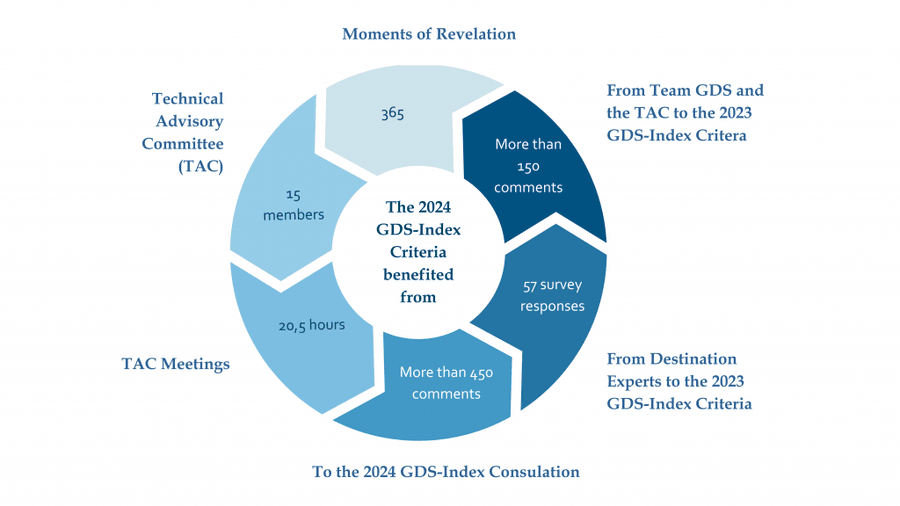We are pleased to announce that the 2024 GDS-Index Criteria and Methodology are now live.
We would like to send a heartfelt, “thank you” to the members of the Technical Advisory Committee (TAC), CityDNA’s Sustainability Knowledge Group, and the many other experts involved, for their invaluable support in this complex development process.
About GDS-Index
For those still discovering the benefits of data gathering and analysis to support visitor economy development, the GDS-Index is a performance improvement programme for benchmarking, improving, and recognising destinations’ sustainability strategy, performance, and regeneration. It showcases brave, bold, and pioneering cities and towns that recognise the urgent need to regenerate by working together so that people, place, and planet can flourish.
Refining GDS-Index Criteria
As the visual below illustrates, the GDS-Index works! The average performance of the top ten participating destinations has increased steadily over the last eight years, and it is this positive trajectory that we wish to invest in for all destinations.
As we need to respond to an increasingly-challenged reality at a pace and scale greater than previously thought to ensure well-being and health, the 2024 GDS-Index Criteria hold immense value to all impacted by tourism and events.
The Process
Each year, we benchmark 4 main categories: Environmental, Social, Supplier, and Destination Management Performance.
In a robust and comprehensive review process over the last year, including the TAC, participating destinations past and present, industry experts, and GDS-Movement’s own changemakers, we gathered valuable feedback that has been used to improve the criteria and make them more future fit.
The GDS-Index Criteria process was guided by the ISEAL Codes of Good Practice.
The Areas of Improvement
With this input, we improved or introduced the following sub-categories: water management, circular economy, short-term tourism rentals, funding mechanisms, resident sentiment, climate action, visitor management, capacity building, mobility, and DEI.
The Results: the 2024 GDS-Index Criteria
The result is 77 criteria comprising 28 improved, 12 new, and 37 unchanged, making a more relevant and rigorous index that measures current performance, assesses future-facing strategy, and better guides cities towards greater regenerative destination management.
The refined criteria address evolving economic, social, and environmental challenges facing destination marketing and management organisations, and their aspirations to be part of positive global transformation. To support destinations to adapt to these updates, we’re making the criteria available sooner than usual, and in the next weeks, we will be providing additional training to participating destinations.
- Download the 2024 GDS-Index Methodology and Criteria here
- Join the 2024 GDS-Index before 19 March here
Measuring Progress Together
The more we measure destination sustainability to manage it, and collaborate radically using strategy and methodology designed for life, the better we can transform tourism and events into a tool for positive change, as these 40 leading GDS-Index cities are doing.
If you would like your destination to be part of GSD-Movement and participate in the 2024 GDS-Index, please sign this agreement, and return it to us by 19 March.
With the help of the greater GDS-Movement community, the 2024 GDS-Index is not just measuring progress in destination sustainability, it is inspiring and improving regeneration in participating cities, regions, and countries across the earth.





